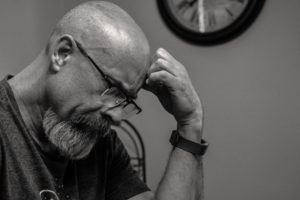Is it sadness, or depression?
These days, many of us are having strong emotional reactions to the Covid-19 pandemic. In these painful and uncertain times, it’s understandable to feel scared, sad, upset, or irritable. Some of us are having trouble sleeping or we’re having crazy dreams when we finally do fall asleep. Some of us are losing our appetites; some of us are can’t get enough comfort food.
It’s to be expected that we’re all struggling a bit right now. The pandemic is terrifying; the social isolation is painful; the experience of loss is overwhelming. But how do you know when what you’re feeling isn’t normal sadness or grief but has become clinical depression?
There are 12 signs when, taken all together, might indicate that you’re more than sad, more than upset. They could mean that you’re depressed.
If you have 5 or more of these signs, it’s time to reach out to your family doctor or a mental health professional and get the help that you deserve.
Here are the 12 signs that you might be depressed:
1. Waking in the night. Depression tends to wake you up a few hours after you’ve fallen asleep. Anxiety, on the other hand, tends to prevent you from falling asleep in the first place.
2. Not feeling refreshed in the morning. With depression, no matter how much you’ve slept, you’ll often wake up in the morning feeling tired and groggy and wanting to go right back to sleep. You can feel worse in the morning than any other time of day — this is called “diurnal variation” and it’s a classic sign of depression. When you’re sad, you generally feel better first thing in the morning but when you’re depressed, mornings are often the worst time of the day.
3. Uncontrollable crying. It’s natural to have a good cry every now and then, especially these days when there’s been so much loss, but if you can’t stop crying you might be depressed.
4. Changes in appetite. If you can go all day without any interest in eating or if you’re suddenly so hungry that you can’t get enough to eat, either one could mean that you’re depressed.
5. Feeling helpless or hopeless. These feelings are generally not present in ordinary sadness and are more typical of clinical depression.
6. Feeling intense guilt or shame. These feelings can happen independently of a mood disorder but often, they’ll accompany depression.
7. Cognitive difficulties. With depression, you can have problems with focus, concentration and memory. For older individuals, depression can mimic dementia because the cognitive difficulties can be so similar.
8. Extremely low energy and fatigue. Even if you’re getting enough sleep at night, depression makes you feel lethargic and exhausted, most of the time. Often, you won’t even have the energy to get out of bed in the morning.
9. Feeling numb or “blah.” Feeling “flat” is a common sign of depression. When you’re depressed, there’s very little that lifts your mood or cheers you up.
10. No motivation. Not wanting to do anything – even the things you usually love to do – is a typical sign of depression.
11. Social withdrawal. Not wanting to see anyone – even the people who you love – is a common sign of depression.
12. Suicidal thoughts. In more serious cases of depression, you could start having fleeting thoughts of wanting to die, plans of how you’d hurt yourself or even a clear intention to act on these thoughts. This is a mental health emergency and you need to tell someone immediately how you’re feeling and get help. With the appropriate treatment, these feelings will quickly go away.
Suicidal thoughts are a mental health crisis
If you’re having thoughts of suicide, you should know that it’s the depression talking and that once you get the right treatment, you’re going to feel a lot differently. Please seek out treatment rather than suffer in silence or act on your feelings.
There are many options for self-care
If you have only 2 or 3 of the first 11 signs of depression, it’s still a good idea to consider one or more of the following options:
1. Talk to your family doctor or mental health professional about options for getting help.
2. Talk to a supportive, understanding friend or family member.
3. Practice basic self-care such as Mindfulness Meditation, regular exercise, creativity, yoga and breathing exercises, good nutrition and proper sleep hygiene.
Excellent treatments are available
The treatment for clinical depression is usually a combination of medication and psychotherapy. The medication has come a long way and today there are highly effective treatments with minimal side effects.
The medication is not habit-forming, it won’t take away your feelings and it won’t change your personality. What it will do is help you break free of the crushing symptoms of depression.
Virtual psychotherapy is now available, on-line or by phone. There are many different types of talk therapy that you could choose from and many are covered by private or government insurance plans.
A list of resources
The Canadian Mental Health Association (CMHA) is an excellent resource for people who are looking for information or services. In the US, Mental Health America (MHA) is a similar resource. Feel free to reach out to either one of them if you feel the need for support.
There are suicide hotlines in every community. In Canada, you could try Suicide.org. In the US, you could try the USA National suicide and crisis hotlines, and around the world, there are hotlines in most countries.
Sign up here for my free biweekly wellness newsletter that brings you fresh, thought-provoking content.
Subscribe to my YouTube Channel where you’ll learn simple tips for taking the best care of yourself and your loved ones.
Tune in to my Ruthless Compassion Podcast where I go in-depth about topics like mental health, trauma, and loneliness.




